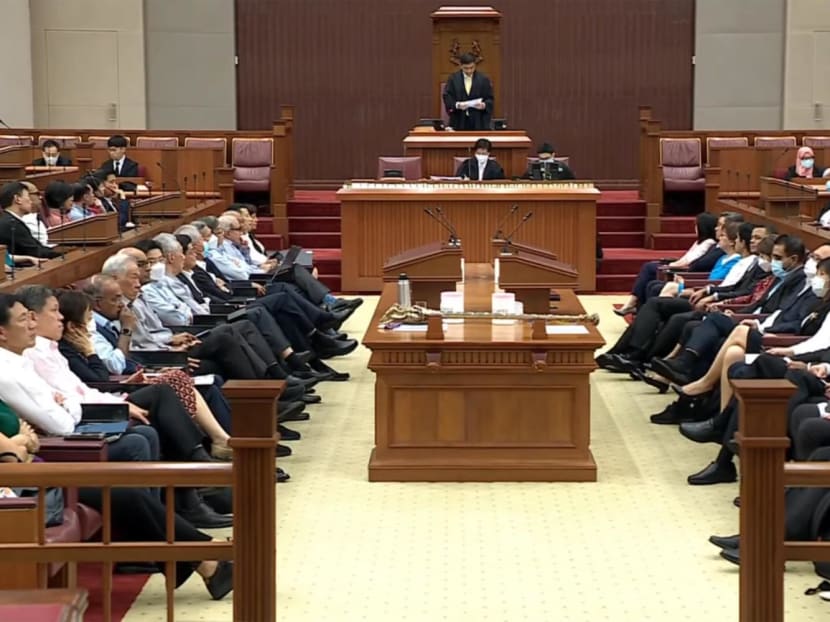Explainer: Speaker Tan Chuan-Jin's use of 'unparliamentary language' — what are the House's rules on such conduct?
SINGAPORE — Speaker of Parliament Tan Chuan-Jin on Tuesday (July 11) apologised for using "unparliamentary language" in his reaction to a speech made by Workers' Party Member of Parliament (MP) Jamus Lim of Sengkang Group Representation Constituency (GRC).

Singapore Parliament on Nov 29, 2022.
- Speaker of Parliament Tan Chuan-Jin issued an apology after a video clip of him uttering "f****** populist" on April 17 during the debate on the President’s address circulated online
- However, according to the Standing Orders of Parliament, questions and speeches should not include unparliamentary language such as vulgarities
- Experts say that while these rules do apply to the Speaker, this hot mic incident is similar to that of Foreign Affairs Minister Vivian Balakrishnan's "illiterate" comment made in September 2021, and no action was taken then
- They add that while the matter could also be considered closed as Associate Professor Lim has accepted Mr Tan's apology, Mr Tan may regard it as appropriate for him to apologise to the House at its next sitting
SINGAPORE — Speaker of Parliament Tan Chuan-Jin on Tuesday (July 11) apologised for using "unparliamentary language" in his reaction to a speech made by Workers' Party Member of Parliament (MP) Jamus Lim of Sengkang Group Representation Constituency (GRC).
Mr Tan’s apology on his social media accounts came after a video circulated of him muttering the words "f****** populist" on April 17 during the debate on the President’s address.
He had uttered the vulgarity after Associate Professor Lim spoke about the need for an "official poverty line" to help the poor and disadvantaged, as he advocated for equal opportunities for education, healthcare and employment for all.
What are Parliament's rules on the use of unparliamentary language? Do they apply to the Speaker? How were previous incidents handled?
TODAY speaks to political analysts and legal experts to find out.
WHAT ARE THE RULES ON UNPARLIAMENTARY LANGUAGE?
As Parliament is the institution responsible for enacting legislation and also where important national issues and government policies are debated, MPs have to conduct themselves with decorum in the House.
The Standing Orders of Parliament — to which MPs are required to adhere — spell out the rules and practices to ensure fairness and the efficient use of time, said Parliament in a social media post in January 2022.
They allow for a "dignified, orderly and effective conduct of proceedings, even as members have the opportunities to give speeches, clarifications and explanations on certain matters".
According to the Standing Orders, "all members shall enter or leave Parliament with decorum" and the contents of questions and speeches should not contain “offensive expressions”.
Parliament's website states that unparliamentary language refers to “words or expressions which are offensive and insulting and which should not be used during parliamentary proceedings.
“Any member found using such words or expressions will be called upon by the vhair to withdraw them immediately, failing which he may be in breach of parliamentary privilege.”
However, as Speaker of Parliament, Mr Tan oversees the House and enforces the rules of the Standing Orders. He also chairs the Committee of Privileges, which looks into complaints alleging breaches of parliamentary privilege.
Parliament's Standing Orders are silent on what happens if the Speaker himself uses unparliamentary language, said Mr Benjamin Joshua Ong, a constitutional law expert who is an assistant professor at the Singapore Management University (SMU).
He added that matters of conduct in Parliament are for Parliament itself to regulate.
"There is no law that spells out the consequences of using unparliamentary language; that is for Parliament itself to decide," he said.
Nonetheless, political watchers and lawyers said Mr Tan is not exempt from the standards and expectations of parliamentary decorum.
“The Standing Orders apply to the Speaker as they would to any MP,” said political analyst Eugene Tan.
“Given that the Speaker is responsible for ensuring orderly conduct in Parliament’s proceedings, in respect of both the behaviour of members and the exercise of business, the standards and expectations of the Speaker are arguably higher than that of a backbencher MP,” added Associate Professor Tan, who is also a law lecturer at SMU and former Nominated MP.
If action has to be taken against a Speaker's conduct, how may it be done?
One way is that the Leader of the House, who is currently Ms Indranee Rajah, can refer a matter involving unparliamentary conduct over a breach of parliamentary privilege to the Committee of Privileges — this includes using unparliamentary language such as vulgarities.
Another way is for an MP to file a motion, calling for the Speaker to be referred to the committee should requisites be met.
“As the committee is chaired by the Speaker, if the matter involves the Speaker, then the Speaker will be suspended from serving on the committee,” said Assoc Prof Tan.
HAS ANYONE BEEN TAKEN TO TASK BEFORE FOR USING UNPARLIAMENTARY LANGUAGE?
In September 2021, Minister for Foreign Affairs Vivian Balakrishnan apologised to Progress Singapore Party (PSP) Non-Constituency MP Leong Mun Wai for calling him "illiterate" and questioning his educational credentials.
Deputy Prime Minister Lawrence Wong had tabled a motion on securing Singaporeans’ jobs and livelihoods in response to PSP’s motion on Singapore's foreign talent policy that was filed by Mr Leong.
During the marathon 11-hour debate, Mr Leong asked Manpower Minister Tan See Leng for some clarity regarding some statistics.
That was when Dr Tan See Leng’s microphone picked up Dr Balakrishnan saying that Mr Leong “is illiterate”.
Later, the same voice was heard saying: “Seriously, how did he get into RI (Raffles Institution)?”, before adding: “Must have been a lousy school”.
Dr Balakrishnan said in a Facebook post: "I disagree with him on the issue, but I should not have said what I said. Mr Leong has accepted my apology."
No further action was taken against Dr Balakrishnan.
This is not the only incident where an MP has been caught using unparliamentary language.
The late Ling How Doong, who was Singapore Democratic Party (SDP) chairman, was formally censured after he uttered “don’t talk c**k” during a parliamentary sitting in November 1995 in a debate on the independence and integrity of Singapore’s judiciary.
Ling had been in conversation with opposition MP Chiam See Tong when he said the infamous sentence, interrupting then-Deputy Prime Minister Lee Hsien Loong, who was addressing the House at that time.
The then-Speaker of Parliament Tan Soo Khoon called for order, to which Ling responded that he was “not going to tolerate a chap who does that”.
According to Hansard, Ling added: “He should seek your permission first before he speaks to me. When he is unparliamentary, why should I be parliamentary to him?”
In a letter to the Speaker after the parliamentary sitting, Ling claimed that Mr Chiam had been taunting him, calling him a “bumbling idiot”.
HOW DO THESE CASES COMPARE TO MR TAN CHUAN-JIN’S?
In the cases of Ling and Dr Balakrishnan, neither man was referred to the Committee of Privileges — though Ling was censured by the Speaker.
Experts noted that Mr Tan Chuan-Jin had muttered under his breath, rather than making his remarks while he had the floor. This hot mic incident, where a remark was inadvertently picked up by a live microphone, is similar to Dr Balakrishnan's.
"The Committee of Privileges deals with egregious cases such as Ms Raeesah Khan’s lying to Parliament. Mr Tan (Chuan-Jin)’s remarks were inappropriate but I don’t regard it as being egregious. The context matters," said Assoc Prof Eugene Tan.
Ms Nydia Ngiow, managing director of advisory firm BowerGroupAsia Singapore, said that while some may feel that action ought to be taken against Mr Tan Chuan-Jin given his position, a key factor to consider is that his comments were not meant to be on the record.
"However, unlike previous incidents that explicitly went against parliamentary procedure, both Mr Tan (Chuan-Jin) and Dr Balakrishnan’s comments — while incendiary and thus rightfully condemned — were intended to be off the record, and as such, are unlikely to result in official action," she said.
So what is likely to happen next in the latest episode?
Political experts say it is possible that Mr Tan Chuan-Jin would offer an apology during the next Parliamentary sitting before the matter is laid to rest.
"As the matter is probably treated as closed by both MP Jamus Lim and the Speaker, it is unlikely that there is life in the matter," said Assoc Prof Tan of SMU.
"It may well be that the Speaker may regard it as appropriate for him to apologise to the House when Parliament next sits again."
Dr Felix Tan, a political analyst with Nanyang Technological University, agreed.
He said that using a vulgar comment, even though it is not meant to be heard, is "rather unbecoming" of a Speaker and it would be "prudent" for Mr Tan Chuan-Jin to publicly apologise in the House at its next session.
However, he added that there is no need to blow the matter "out of proportion".
"This is because he has already personally apologised to WP’s Jamus Lim and Jamus has also accepted his apologies," explained Dr Tan.
"While this episode has certainly been rather unfortunate, it does demonstrate how and what MPs might actually think or internalise. Nevertheless, as the saying goes: To err is human; to forgive divine."











